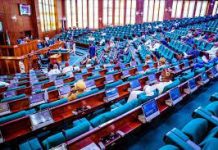He also listed the effects of rise in corruption during COVID-19 on governance in Nigeria including the fact that only few states published COVID-19 spending such as Ondo, Oyo, Delta, Kwara and Abia; palliatives were not distributed to the citizens; pocurement Processes were not made public; eight Ministries Departments and Agencies (MDAs) allegedly misappropriated N3 billion; uprecedented demand for Personal Protective Equipment (PPEs); panic creating perfect cover for the criminal and the corrupt; and emergency procurement procedures limiting transperancy.
COVID-19: ICPC to prosecute palliative looters
The Independent Corrupt Practices and Other Related Offences Commission (ICPC) has vowed to investigate and prosecute persons who engaged in any acts of corruption through the mismanagement of COVID-19 funds and palliatives.
This assertion was made as stakeholders in the anti-corruption drive in the country decried not only the rise in fraud and corruption risk during the coronavirus pandemic, but also the billions of dollars lost annually through illicit financial outflows (IFFs) from Nigeria in particular and Africa in general.
The ICPC Chairman, Prof. Bolaji Owasanoye, gave this warning at the weekend during the roundtable discussion on ‘Fighting Money Laundering in the COVID-19 Era: Challenges and Opportunities’, organised by the Civil Society Legislative Advocacy Centre (CISLAC) in collaboration with the United Nations Office on Drugs and Crimes (UNODC), and Presidential Advisory Committee Against Corruption (PACAC).
Owasanoye who was represented by the Assistant Commissioner, Mr. Michael Agboro, noted that the need to intensify action in the fight against corruption has become more imperative because of the challenges that COVID-19 emergency response has brought to the fore.
He added that in a bid to save more lives normal procurement processes and procedures, which in normal time had their peculiar challenges in curbing corruption pre-COVID-19, had to be set aside for emergency procurement processes with minimal mechanism to guarantee transparency and accountability, especially when the essence is to ameliorate hunger, starvation and death ravaging the world and fear that the escalation of the pandemic portends to Nigeria.
To this end, he said, the Commission will continue to beam its searchlight on the COVID-19 response activities and other sectors to ensure probity, transparency, accountability and integrity.
He the stressed that “as part of measures by the Commission to rid the country of corruption, we have adopted a sectoral approach to the fight against corruption and will continue to partner with other relevant agencies to combat money laundering and illicit financial flows.
“The Commission will not hesitate to investigate and prosecute any person who takes advantage of the emergency and exigency surrounding COVID-19 to commit acts of corruption and other related Offences, money laundering and economic sabotage through illicit financial flows.”
Also speaking, the Executive Secretary of PACAC, Prof Sadiq Radda, who likened corruption to a cancer that was so difficult to defeat, said there was the need to replicate the anti-corruption efforts at the federal at the state and local government levels.
“A lot is being done at the federal level but it is still business as usual at the state and local government levels,” he said.
The Chair of Transparency International, Delia Ferreira-Rubino, who joined the meeting virtually, said accountability measures must be put in place in the pandemic era.
She regretted that “we have had accountability in quarantine in many countries”.
In the same vein, the Executive Director of CISLAC, Mr. Auwal Ibrahim Musa also known as Rafsanjani, noted that the exigencies arising from the COVID-19 pandemic created avenue that accelerated the trend for criminals to explore new avenues for cyber crime and corruption.
According to Rafsanjani, one of the consequences of the pandemic has been the criminality has become more global than ever including acts of corruption, which he noted, thrives due to relaxed compliance procedures, emergency procurements and chaos triggered by the global emergency.
“In managing the economic fallouts of the pandemic, the government committed to judiciously disburse funds and provide clear results of expenditures through transparent procurement processes and published audit reports. However, realities seem different as allegations of mismanagement/misappropriation of funds, non-transparent management of palliatives and the lack of comprehensive data for in-depth analysis, ” he said.
The CISLAC Director also lamented about the damming revelation that about $18 billion leaves Nigeria annually through assets moved abroad, tax evasion and illicit financial outflows.
Also, Mr. Vaclav Prusa from CISLAC in his presentation on ‘Corruption risks in the COVID-19 period’, highlighted the fact that Africa loses about $88.6 billion every year through illicit financial outflows and that every $1 that comes into the continent about $2 is lost.
Prusa also listed key factors driving the rise in fraud and corruption risk during the pandemic to include: dramatic expansion of public spending internally and externally, weak procurement oversight, corruption or misuse of public funds without consequences, relaxed/diminished enforcement efforts, lack of transparency and accountability mechanisms, as well as people bribing their way around restriction of movement during the COVID-19 lockdown.
Follow Us On WhatsApp



